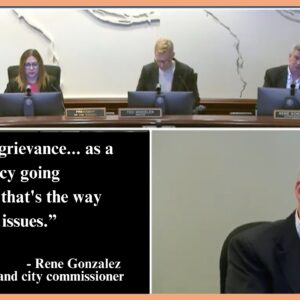The Portland Clean Energy Fund Committee is walking a tightrope: If they play too hard-to-get when it comes to opening up revenue from their corporate tax earnings to City of Portland bureaus, they risk stoking the ire of City Commissioner Rene Gonzalez who is desperate for bureau funding and is poised to refashion the tax and refer it to voters for a complete overhaul to get it. But if the committee compromises too much with Gonzalez and City Hall, they risk alienating the powerful sea of nonprofit groups who helped pass the policy and support it wholeheartedly in its current form.
PCEF was passed by voters in 2018 as a 1% tax imposed on large retailers with $1 billion in national revenue and $500,000 in revenue in Portland. It aims to invest in climate change-related projects that will benefit low-income and Portlanders of color who are on the front lines of extreme weather and other climate threats. So far the fund has been a boon to bicycling and has dedicated $80 million to an e-bike purchase subsidy and other programs. It’s also helped save the PBOT budget thanks to a $112 million injection into the transportation budget from Commissioner Carmen Rubio (who oversees the fund through the Bureau of Planning & Sustainability).
But there’s still money to spend. Thanks to a spike in corporate profits and a delay in tax filings after the pandemic, the fund has amassed a huge sum — an estimated $540 million — beyond projections. That has left PCEF’s coffers swelling just as the City of Portland’s coffers are nearly empty. That dynamic has set up a tug-of-war around how the money should be spent and who controls the pursestrings. Gonzalez wants the money for police and fire bureau needs and Rubio is going after the interest to fund Portland Street Response — neither of which have a connection to climate change.
A document made public today lays out for the first time how the PCEF Committee proposes to balance these competing forces in the next allocation of $158 million.
The committee has been under pressure to make a recommendation to Portland city council about how to spend that additional revenue. They laid out three options for how do so at a February 15th meeting. Two of the options included a “rapid timeline” that would come up with a process to allocate the funds by May (in time to be included in the Mayor’s proposed budget). A third option called for a longer timeline that would give the committee time to solicit more collaborative proposals and would allocate the funding by this fall.
The first two options were better for city bureaus who want money immediately; but the third option would allow PCEF to more closely adhere to the policy that underpins the program — a policy that mandates a more collaborative approach where nonprofits play a significant role in allocation decisions. But the details of option three were limited, and PCEF committee members felt they couldn’t vote until it was fleshed out.
The proposal released today lays out four eligibility requirements for applicants who want one of the $20-$100 million grants: Funded projects must “meaningful and measurable reduction or sequestration of greenhouse gas emissions”; the primary applicant must be a nonprofit or government entity and demonstrate support from a community coalition, and all applications must include a community benefits agreement. The last eligibility requirement is perhaps the most important: The aforementioned coalition must include, “At least one non-profit community-based organization with a minimum of eight years’ experience in conducting community engagement in Portland focused on PCEF priority population.”
If those requirements are met, then applicants must go through a two-step process: submit a letter of interest (LOI) and then, if approved, they can submit a full application. The PCEF Committee expects to invite four to eight applicants to submit full proposals. The deadline for LOIs would be May 10th and project recommendations would be made in early September.
While this proposal likely isn’t exactly what Commissioner Gonzalez would prefer, it also clarifies the eligibility of city bureaus and gives him and all other members of council an opportunity to benefit from PCEF. Whether it’s enough to make him reconsider his previous stance on PCEF remains to be seen.
This proposal will be shared publicly for the first time at the PCEF Committee meeting that begins at 6:00 pm tonight (3/21). Once it receives support from the committee, it will then be forwarded as a recommendation to City Council where conversation will continue. Stay tuned.
UPDATE: The PCEF Committee voted in support of the proposal at their meeting Thursday night. Now it goes to city council. The Oregonian reported Thursday night that Commissioner Rubio has abandoned her plan to use funds from interest on PCEF revenue.









Thanks for reading.
BikePortland has served this community with independent community journalism since 2005. We rely on subscriptions from readers like you to survive. Your financial support is vital in keeping this valuable resource alive and well.
Please subscribe today to strengthen and expand our work.
PCEF is one example of a taxing and funding policy that has been used to fund popular ideas, but has some real flaws. In short, it would be nice if we could actually direct our local governments’ funding priorities, rather than create these easily mismanaged, bespoke funding mechanisms!
Other examples are the Metro Housing Bond and Portland Arts Tax.
Characteristics:
— a voter approved ballot measure,
— with a bespoke tax,
— which was marketed to voters as a way to fund a popular priority (such as addressing climate change),
— and which ends up being used to patch holes in the budget which are caused by the government’s other spending priorities.
It works like this: voters feel that their local governments aren’t adequately addressing some issue (arts funding, climate resilience), and advocates get a ballot measure passed by arguing that the ballot measure will force the City to address the priority.
As I see it, these measures are voters’ attempt to direct a local government’s budget prioritization, because the elected leaders don’t seem willing or able to change the prioritization themselves. Voters could theoretically vote for individual candidates that agree with their preferred policies, but the issues at stake in elections haven’t been specific enough to resolve this mismatch.
Practically, all of our local candidates are “for” affordable housing, the arts, and climate resilience. Especially in City Council elections, it hasn’t mattered what a candidate runs on, because the Mayor could put them in charge of completely unrelated bureaus!
Some flaws:
Since these taxes haven’t changed the real priorities of these governments…
The taxes add to the existing tax burden, rather than re-direct funding. We all just pay more taxes, rather than, for example, diverting funding from auto-oriented road projects to bike-oriented projects.
– The funds are subject to diversion. For example, while the Arts Tax was marketed to local arts organizations as a way to get steady funding, they’ve seen little steady money from the tax, even though the local arts community lobbied the public in support of the measure, and the public understood the tax to be of great benefit to these organizations.
– Sometimes, governments just literally don’t spend the money (Multnomah County Homeless Services Tax).
– There’s little democratic accountability. One can’t just vote the Arts Tax out of office.
I seriously think people are fed up that local governments don’t address climate change, fund the arts, or make more housing and would be happy if they perceived that City had made these kinds of things priorities in the budget; they may not be thinking about the total amount of taxation, or the fact that the money will end up going other places!
I goofed up: it’s not the Metro Housing Bond funds that have gone unspent, but rather the Multnomah County Homeless Services Tax!
You’ve pretty much said it all here, Charley. I would only add that these bespoke taxes tend to alienate important voter-groups that are impacted disproportionately. Look at the exodus of businesses from Multnomah County to Clackamas and Washington counties, which don’t have the pre-school or homeless-services taxes. Remember that since only high-income earners pay these taxes AND these high-income earners are the people who run businesses, the same people can decide to move their businesses. And they are!
Taxes work only if EVERYONE bears a proportionate burden. If you care about ending homelessness or stupidity or whatever, you should pay for it – what little you can afford. If you vote for someone else to pay while you pay nothing, eventually the other guy is going to find a way NOT to pay, usually by leaving.
The other thing with these bespoke taxes is that they breed deep cynicism when people see tax dollars NOT addressing the problems they were meant to address. The homeless services tax, for example, is paid by the people who will NEVER need these services and who see what a crappy job the county is doing of helping homeless people. The result is deepening cynicism and plans to move away.
Fred, why is it that you accept an essentially rational/realist view of most issues (in this case, people who are both mobile and subject to special taxation will leave, especially if they see their money being squandered), but criticize me for doing the same with issues related to driving (people will continue driving as long as it’s the best transportation option for them)?
Because not all issues are the same. The realist/rationalist view of human behavior in response to climate catastrophe will lead us inexorably to … catastrophe. When we are faced with an existential threat, a realist view is insufficient.
Avoiding taxes is NOT an existential issue – just an annoying one. So it’s easy to make an argument that people behave rationally in these situations.
I’m not a total anti-rationalist when it comes to driving. I accept that we have built a world centered on cars and driving. I just don’t accept that it has to be that way – and frankly it CANNOT remain that way if we’re to have any chance of surviving the next 50 years, or our grandchildren the next 100 years.
It might well do that. Nonetheless, is it not an accurate description of how people behave?
I don’t advocate for driving (I know you’ll disagree, and I’m happy to have you throw my words back at me if you can find a clear example of me doing this), but I do think if we want to change behavior, we need to be rational and realistic about why people do it so much. The usual explanations (“they’re addicts!”, “they’re lazy!”, “they’re brainwashed!”) aren’t helpful.
I’m firmly in the camp of Democrats that believes that we need to run the government really well, in order to shore up support for policies that I prefer. If the government appears feckless and wasteful, we invite valid criticism from the Right that government is itself the problem.
I lived in Portland until fall of 2022, and I voted FOR all of these taxes; I wish I could have just counted on local governments to budget for and address these issues, rather than vote on these Rube Goldberg measures!
I find this argument compelling, but I no longer believe it is possible for our current state and county governments (to name two) to handle the complex issues they have before them. The list of failures is far too long for it to be a series of bad managers or inept individuals. I think there is something structurally wrong.
The sad part of this is that we really do need government agencies to be firing on all cylinders, and they just aren’t.
I wish I knew the solution.
Well, you could insert any particular pet issue in place of these bespoke taxes, and conclude that’s the reason businesses are leaving, since we don’t really have a causal connection between the two phenomena. We don’t know why these few example businesses have left. They lie regularly about their reasons anyway, e.g. Target blaming theft, etc.
How did you come to that conclusion? If REI really is leaving because of the taxes, how would that differ if we were all also paying taxes? Eventually the other guy is going to find a way NOT to pay no matter what you do, regardless of if everyone else is paying a “fair share”. The “other guy” (i.e. the businesses and rich who are really the ones who can pay) don’t care, they are going to try to wriggle out of paying.
I nominate this for comment of the week.
We elect representatives to set policy and budget priorities, but then hamstring their ability to properly fund core services like emergency response, parks, and transportation by giving an absolute glut of money to solve problems beyond the scope of the city, i.e. climate change. The bespoke taxes are essentially special interests doing an end run around our government.
Any reduction in greenhouse emissions should be a byproduct of sound policy choices that improve core services, such as building out a safer, more efficient and reliable public transit service and bike network. I am very dubious that there are local non-profits that have the wherewithal to meaningfully and verifiably sequester enough greenhouse emissions to justify an allocation of $100,000,000 from taxpayers, especially with the caveat that it must prioritize a “preferred population.”
We need to give our municipal taxation authority back to elected representatives, who are in a better position to see the greater revenue picture and thus better equipped to set the budget priorities.
Oh, you sweet, summer child. Yes, the Water House and the Rose sign WERE the biggest priorities in those budget cycles. According to Randy The Lesser, of course. Egos, whims and windmills are as often the driver of budgets as rational need assessment.
But yes, in a non-gerrymandered structure, we can vote the idiots out who fail to pursue what we feel is a rational budget strategy. Good luck getting that barnacle of an Arts Tax off.
Outsourcing government services to non-profits is starting to get a hard look (in some corners of the internet, at least). It can work great, if the expertise and scale match the problem! It can also cost a lot of money and not succeed.
And I would argue it is NOT succeeding – and probably will never succeed – b/c the nonprofits in question have an incentive to keep the problems going rather than solve them.
Look at all of the homeless nonprofits essentially arguing for people to remain on the street? It’s ridiculous.
Sorry Charley, I lost your bullet formatting in correcting your Metro/Mult mix-up, JM is going to look at it.
P.S. There is a bug at the backend, we can’t get the bullets to take, sorry!
The dashes work great- thanks!
Sorry, Charley. Starkist wants tuna that tastes good ….
(I never understood that joke when I was a small kid – went over my head.)
Believe it or not, I didn’t know the origin of that phrase until looking it up after reading your comment! For years people would just say it to me and I’d nod along, figuring it was some kind of reference to something I don’t know 🙂
A modest proposal: require that all proposed local special issue (“bespoke”) taxes must be renewed by voters every five years to remain in effect, or they terminate. Taxpayers deserve an opportunity to periodically evaluate whether a program is achieving the objectives they were originally sold, to consider whether those objectives are still in fact worthy, and to decide whether the administrative beauracracy put in place is making reasonable use of taxpayers’ money. A periodic renewal ballot measure can also provide an opportunity for advocates to make any needed adjustments to the program to earn continuing voter support. Seeming like a good idea at the time should not be enough to enshrine a special issue tax in untouchable perpetuity.